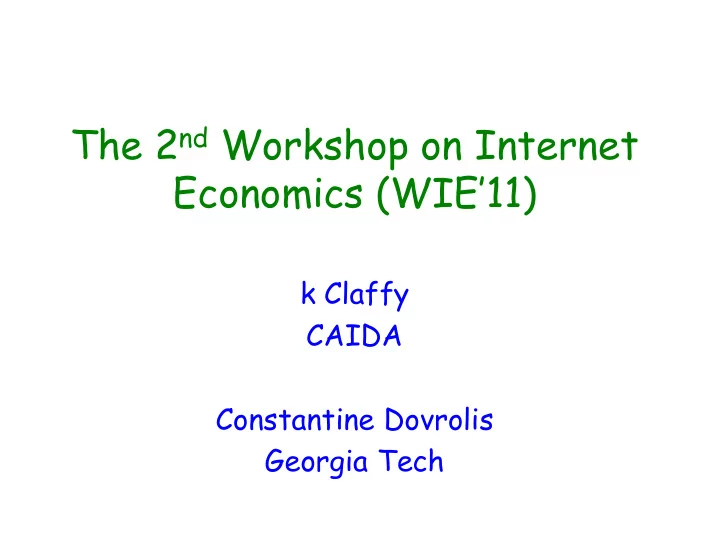

The 2 nd Workshop on Internet Economics (WIE’11) k Claffy CAIDA Constantine Dovrolis Georgia Tech
Overview • Why this workshop? – And why Now? • Scope and relevant issues/problems • What we want this workshop to be (and what we don’t want it to be) • Objectives • Process • Participants
Why this workshop • The economics of Internet interconnections are more complex and more critical than ever before • Despite its real-world importance, this area is still mostly “unknown territory” in academic research – Mostly due to the lack of public data and transparency
Objectives of this workshop • Primary objective: create a *research agenda* for the economics of Internet interconnections – And probably publish it at CCR – If you are interested to co-author that, plz let us know • Foster collaboration and bi-directional information transfer between research and industry • Community-building
What we don’t want this workshop to be • An academic conference – Nothing wrong with academic conferences, but.. • A NANOG-like meeting – Nothing wrong with NANOG, but.. • A battle-zone between academics and industry folks – We have different objectives, different language, different methods, but we are interested in the same issues
Relevant issues/problems • Peering strategies – How to decide strategically who to peer with? – And what happens when everyone peers strategically? • Paid peering – Who should be charging whom? – And how much? – Is paid peering helping to resolve peering disputes, or does it create more disputes?
Relevant issues/problems • The role of IXPs in the peering ecosystem – What if every city had an IXP and every major Content provider (or CDN) was present at every IXP? • Multi-lateral peering agreements – Versus bilateral peering • The role of CDNs and their economics – Different CDNs peer differently • What is the best CDN deployment/peering model? – How should ISPs charge (or not charge) CDNs?
Relevant issues/problems • Tier-1 disputes – “I should also be a Tier-1 network” – “You should not be Tier-1 anymore” – How can we design an economic/peering framework to avoid such disputes (without ending up in “FCC territory” & regulation) • Disputes between Content Providers and Access ISPs – Is paid-peering necessary? Is it fair?
Relevant issues/problems • The role of content (and video in particular) – It seems that people are willing to pay for high-quality video-based entertainment – How should this added revenue be “routed” in the Internet ecosystem? – Video traffic increases significantly the capacity demand on the e2e path • Who should be paying for these capacity increases?
Relevant issues/problems • Economic viability of transit providers – If transit providers make no money, who is going to operate/expand those expensive wide-area backbone networks? – What is the role of transit providers in a world dominated by IXPs, CDNs and few large CPs? – New transit pricing mechanisms? • More fair for the customer, more viable for the provider
Relevant issues/problems • Economic viability of access ISPs – Can they be profitable with flat-rate pricing? – What will happen when users switch to the Internet for all their video/TV needs? – Is usage-based pricing a practical solution? Is it a necessary solution? – What is the proper way to do tiered- pricing?
Relevant issues/problems • Looking at the “big picture”, what is good/bad for the overall Internet? • Is it necessary that what is good for the Internet users is bad for someone else (e.g., transit providers)? • Are there economic mechanisms that can ensure the Internet’s “social welfare”? – Improving the welfare of all involved players (TPs, ISPs, CDNs, CPs, IXPs, users)?
Process • We have few mature research presentations but we also have several discussion sessions as well as work-in- progress presentations • Every presentation has 3-4 respondents – A respondent should engage the presenter to a discussion after the talk – Of course everyone can participate in the discussion – But plz, avoid asking open-ended questions during the presentation
Participants (.edu) Dah Ming Chiu (Chinese University of Hong Kong) John Chuang (UC Berkeley) David Clark (MIT) Richard Ma (National University of Singapore) Constantine Dovrolis (Georgia Tech) Aemen Lodhi (Georgia Tech) Nick Feamster (Georgia Tech) Vytautas Valancius (Georgia Tech) Sergey Gorinsky (Institute IMDEA Networks) Heikki Hämmäinen (Aalto University, Finland)
Participants (.com, .net) Nikolaos Laoutaris (Telefonica) Susan Martens (AT&T) Maurice Dean (Google Inc.) Keith McCallion (Google Inc.) Bill Norton (DrPeering International) Richard Steenbergen (nLayer Communications) Ren Provo (Comcast) Barry Tishgart (Comcast) Patrick Gilmore (Akamai Technologies) Geoff Huston (APNIC) Tom Vest (RIPE NCC)
Hosts (CAIDA) K Claffy (CAIDA) Amogh Dhamdhere (CAIDA) Bradley Huffaker (CAIDA)
Recommend
More recommend